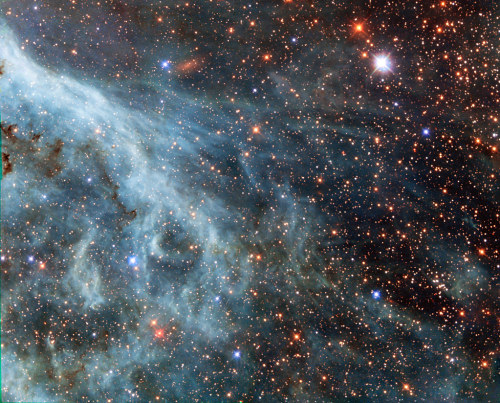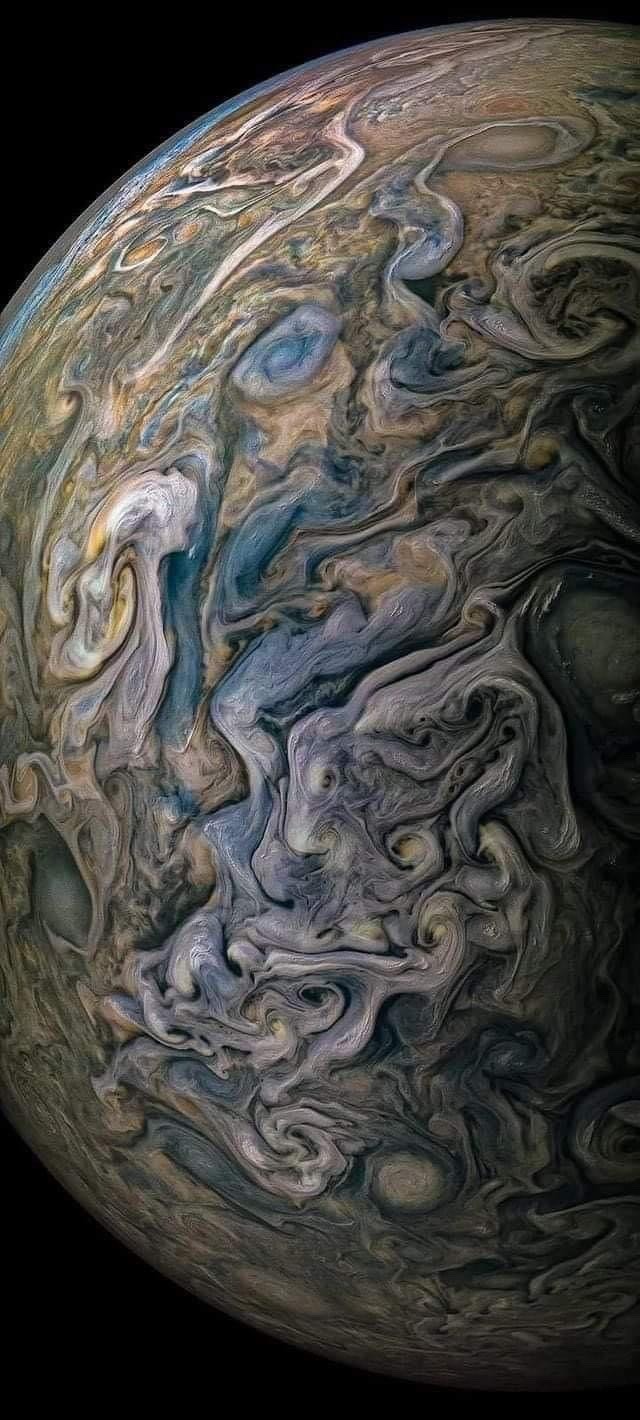NGC 1365, Heart Of The Galaxy

NGC 1365, Heart of the Galaxy
More Posts from Of-finite-jurisdiction and Others


Neptune’s rings in infrared © JWST
It wrinkles my brain that Jupiter’s moon Europa has oceans that are sixty miles deep, while Earth’s oceans only reach seven miles deep at most. I’m willing to bet good money that there’s life in Europa’s oceans. Like five bucks. You hear me, NASA? I bet you five bucks that there’s life on Europa… Now that there’s money and reputation on the line, I bet they send a mission there real quick.

Space Station Silhouette on the Moon : What’s that unusual spot on the Moon? It’s the International Space Station. Using precise timing, the Earth-orbiting space platform was photographed in front of a partially lit gibbous Moon last month. The featured composite, taken from Payson, Arizona, USA last month, was intricately composed by combining, in part, many 1/2000-second images from a video of the ISS crossing the Moon. A close inspection of this unusually crisp ISS silhouette will reveal the outlines of numerous solar panels and trusses. The bright crater Tycho is visible on the upper left, as well as comparatively rough, light colored terrain known as highlands, and relatively smooth, dark colored areas known as maria. On-line tools can tell you when the International Space Station will be visible from your area. via NASA






Stephan’s Quintet/ Carina/ Southern Ring © JWST

Turquoise Plumes in the Large Magellanic Cloud by NASA’s Marshall Space Flight Center

Clearest image ever taken of Venus.
source: https://photojournal.jpl.nasa.gov/targetFamily/venus



NASA’s Webb Space Telescope Reveals Astounding, Unprecedented Views of the Universe





The Clearest Images of Jupiter ever taken
These beautifully real images are some of the closest images of Jupiter. Jupiter is the fifth planet from the Sun and the largest in the Solar System. It is a gas giant with a mass more than two and a half times that of all the other planets in the Solar System combined, but slightly less than one-thousandth the mass of the Sun. The original image was captured by JunoCam, the camera on NASA's Juno mission in orbit around Jupiter. This image was taken on Juno's 22nd close pass by Jupiter on Sept. 12, 2019 with image processing done by Prateek.
📸: NASA's Juno Space Probe / JunoCam
The misconception that there is no sound in space originates because most space is a ~vacuum, providing no way for sound waves to travel. A galaxy cluster has so much gas that we've picked up actual sound. Here it's amplified, and mixed with other data, to hear a black hole!


Jupiter Rotates : Observe the graceful twirl of our Solar System’s largest planet. Many interesting features of Jupiter’s enigmatic atmosphere, including dark belts and light zones, can be followed in detail. A careful inspection will reveal that different cloud layers rotate at slightly different speeds. The famous Great Red Spot is not visible at first – but soon rotates into view. Other smaller storm systems occasionally appear. As large as Jupiter is, it rotates in only 10 hours. Our small Earth, by comparison, takes 24 hours to complete a spin cycle. The featured high-resolution time-lapse video was captured over five nights earlier this month by a mid-sized telescope on an apartment balcony in Paris, France. Since hydrogen and helium gas are colorless, and those elements compose most of Jupiter’s expansive atmosphere, what trace elements create the observed colors of Jupiter’s clouds remains a topic of research. via NASA
-
 goddesscharm reblogged this · 1 year ago
goddesscharm reblogged this · 1 year ago -
 bigmickswingin reblogged this · 1 year ago
bigmickswingin reblogged this · 1 year ago -
 venusonne liked this · 1 year ago
venusonne liked this · 1 year ago -
 moodyonmoon reblogged this · 1 year ago
moodyonmoon reblogged this · 1 year ago -
 moodyonmoon liked this · 1 year ago
moodyonmoon liked this · 1 year ago -
 softmercurio reblogged this · 1 year ago
softmercurio reblogged this · 1 year ago -
 innerfixer liked this · 1 year ago
innerfixer liked this · 1 year ago -
 cha0skidz reblogged this · 1 year ago
cha0skidz reblogged this · 1 year ago -
 warsawmouse liked this · 1 year ago
warsawmouse liked this · 1 year ago -
 sheliesshattered reblogged this · 1 year ago
sheliesshattered reblogged this · 1 year ago -
 animae-meae liked this · 1 year ago
animae-meae liked this · 1 year ago -
 durdntheoryx liked this · 1 year ago
durdntheoryx liked this · 1 year ago -
 briefsweetsshark liked this · 1 year ago
briefsweetsshark liked this · 1 year ago -
 greatshieldmaiden14 liked this · 2 years ago
greatshieldmaiden14 liked this · 2 years ago -
 shibnoota liked this · 2 years ago
shibnoota liked this · 2 years ago -
 deetherusalka reblogged this · 2 years ago
deetherusalka reblogged this · 2 years ago -
 girlwhosuddenlyleft liked this · 2 years ago
girlwhosuddenlyleft liked this · 2 years ago -
 sakkkworld liked this · 2 years ago
sakkkworld liked this · 2 years ago -
 insideoutbrutality liked this · 2 years ago
insideoutbrutality liked this · 2 years ago -
 thereadersruffle liked this · 2 years ago
thereadersruffle liked this · 2 years ago -
 kanakarbakar liked this · 2 years ago
kanakarbakar liked this · 2 years ago -
 ihaventpiickedausername liked this · 2 years ago
ihaventpiickedausername liked this · 2 years ago -
 brianwashere liked this · 2 years ago
brianwashere liked this · 2 years ago -
 knightprincess reblogged this · 2 years ago
knightprincess reblogged this · 2 years ago -
 knightprincess liked this · 2 years ago
knightprincess liked this · 2 years ago -
 iamawolfstarsimp liked this · 2 years ago
iamawolfstarsimp liked this · 2 years ago -
 crystal076 liked this · 2 years ago
crystal076 liked this · 2 years ago -
 mylittlepooka liked this · 2 years ago
mylittlepooka liked this · 2 years ago -
 crosshairsimp73 liked this · 2 years ago
crosshairsimp73 liked this · 2 years ago -
 jeena-says-hi liked this · 2 years ago
jeena-says-hi liked this · 2 years ago -
 jedi-nurse reblogged this · 2 years ago
jedi-nurse reblogged this · 2 years ago -
 exceptionally-minded reblogged this · 2 years ago
exceptionally-minded reblogged this · 2 years ago -
 kittenpinkamations reblogged this · 2 years ago
kittenpinkamations reblogged this · 2 years ago -
 obe-yawn liked this · 2 years ago
obe-yawn liked this · 2 years ago -
 starsgivemehp reblogged this · 2 years ago
starsgivemehp reblogged this · 2 years ago -
 hypnalogue liked this · 2 years ago
hypnalogue liked this · 2 years ago -
 willingprincess liked this · 2 years ago
willingprincess liked this · 2 years ago -
 makingmefearless reblogged this · 2 years ago
makingmefearless reblogged this · 2 years ago -
 alabamasarah liked this · 2 years ago
alabamasarah liked this · 2 years ago -
 views-from-within reblogged this · 2 years ago
views-from-within reblogged this · 2 years ago

Finn OFJ’s space blog. Do you love space?? you better. or else
39 posts